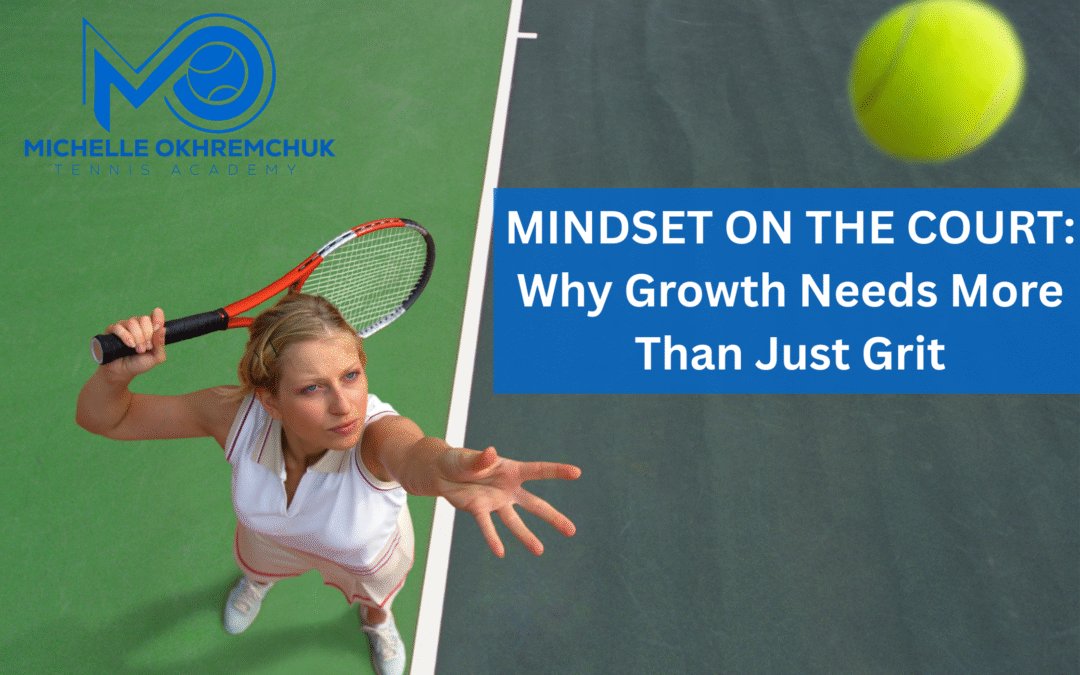📍Intro: Real Talk from Coach Michelle
Lately, I’ve been reflecting on my own mindset, not just as a coach, but as a human being. I always thought I had a growth mindset. I believed in hard work. I believed in pushing through. But what I didn’t realize is how often I was holding myself to perfection, and how that same pressure quietly shows up in the kids I coach.
I see it when a player double faults and looks down in shame.
When a junior loses a match and says, “I’m just not good at this.”
Or when a talented player avoids working on a weakness, not because they’re lazy, but because they’re scared to fail.
That’s not attitude. That’s fear.
And more often than not, that fear is rooted in a fixed mindset.
🧠Fixed vs. Growth Mindset in Tennis
A fixed mindset says:
❌ “I’m either talented or I’m not.”
❌ “If I lose, I’m a failure.”
❌ “Trying something new is risky because I might fail.”
It leads to:
• Playing it safe
• Fear of mistakes
• Harsh self-talk
• Avoiding challenges
• Comparing constantly
A growth mindset, on the other hand, says:
✅ “I can improve with effort and feedback.”
✅ “Mistakes are part of the process.”
✅ “Losing doesn’t define me, it teaches me.”
Players with a growth mindset don’t always win.
But they stay curious.
They try.
They bounce back faster.
🔄When “I Don’t Like It” Really Means “I’m Not Good At It (Yet)”
One of the clearest signs of a fixed mindset is when I hear:
🗣️ “I don’t like volleys.”
🗣️ “I hate serving.”
🗣️ “That drill is boring.”
But it’s rarely about not liking something—it’s about discomfort.
What they often mean is:
❌ “I feel uncomfortable doing this.”
❌ “I don’t want to mess up.”
❌ “I’d rather avoid it than struggle.”
This is where we need to coach more than just technique.
Because avoiding what feels hard now only delays growth.
We teach our players that:
💬 “Discomfort = learning zone.”
💬 “Avoided shots hold you back.”
💬 “You don’t have to like it to grow from it.”
The fastest-improving players aren’t the ones who stick to what’s easy.
They’re the ones who learn to meet challenge with courage, not shame.
That’s the real growth mindset.
🚧When Not Trying Feels Safer Than Trying and Failing
Another pattern I see, especially in teens, is when a player stops trying.
Not because they don’t care…
…but because they care too much.
They’ve learned:
“If I don’t try, and I lose, at least I have an excuse.”
“If I do try 100% and still lose, that means I’m really not good enough.”
This is called protective underperformance, and it’s a mindset shield.
But it also blocks growth.
We challenge it by shifting the focus from results to effort and teaching them that bravery means showing up fully, even when the outcome is uncertain.
😴When “I’m Just Tired” Isn’t About Sleep
Teenagers say “I’m tired” a lot and sometimes it’s just that.
But often, it’s deeper.
“I’m tired” can really mean:
😓 “I’m mentally drained.”
😓 “I don’t know how to stay motivated.”
😓 “I’m overwhelmed, and I don’t want to fail again.”
Teen fatigue isn’t laziness. It’s often emotional.
And when we meet that with curiosity instead of criticism, we help them reconnect, not withdraw.
At the academy, we make space for those moments.
We talk about why they’re playing.
We help reset goals.
And we remind them: motivation doesn’t mean feeling hyped 24/7, it means staying connected to your purpose, even on hard days.
💬What’s Missing? Self-Compassion.
Here’s something I’m learning, even as a coach:
You can’t grow if you’re tearing yourself apart.
A growth mindset is powerful. But without self-compassion, it turns into pressure.
You can work hard and still be kind to yourself.
You can want to win and still be gentle when you fall short.
And the kids who learn that early?
They don’t just become better players.
They become more emotionally resilient human beings.
🎾How We’re Shifting It in Our Academy
At our academy, we’re not just training athletes. We’re training mindsets.
Here’s how we help players build both growth and self-compassion:
• We celebrate effort as much as outcomes.
• We talk openly about nerves, mistakes, and losing and normalize it.
• We encourage players to reframe thoughts like:
• “I’m bad at volleys” → “I’m learning how to improve my net game.”
• We ask questions like:
“What did you learn today?”
“What challenged you the most?”
• And we remind them: One match doesn’t define you. But how you respond to it might.
💡A Reminder for Players and Parents
If your child walks off the court upset, it doesn’t mean they’re weak.
It means they care.
Help them build the skill of bouncing back.
Not by pushing harder, but by listening deeper.
Ask:
🧠 “What did you try today that felt hard?”
💞 “What would you say to a teammate who made that same mistake?”
That’s where the shift begins.
📝Final Word from Coach Michelle
As part of my current Harvard studies in lifestyle and coaching psychology, I’ve been learning more about how deeply mindset and self-compassion influence real, lasting growth. And it’s making me rethink the way we approach “mental toughness.”
Because real mental strength isn’t just discipline, it’s the courage to try, to fail, to learn, and to still believe in yourself.
Whether you’re a beginner learning how to serve, a teenager who’s struggling to stay motivated, or a competitive player afraid to give 100%, remember this:
Your mindset isn’t fixed.
You are allowed to be a work in progress.
And when you meet effort with kindness, everything starts to shift.
Let’s build not just stronger players but stronger minds.
By Michelle Okhremchuk


